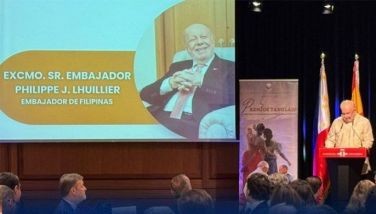How can Senate gauge betrayal of public trust?

RECALL MODE: It used to be that elective executives could be removed under the old Local Government Code for “loss of confidence” by a majority vote of lower-echelon officials acting as a recall assembly.
For instance, a governor of a province with 22 towns could be recalled/removed on the say-so of a majority of 12 mayors voting for his ouster for something as nebulous as “loss of confidence.”
The dozen mayors could undo what the supreme electorate had done — which was the election of the governor to office. Never mind if he was elected by a landslide, or had been honest and performing well.
A governor belonging to the minority party opposed to the ruling party of the majority of the mayors is doomed in the face of the partisan recall vote.
This mode of recalling elective officials was so patently unfair (although legal at the time) that it was dropped when the Local Government Code came up for amendment.
* * *
IMPEACHMENT: This footnote comes to mind as the final chapter of the impeachment trial of Chief Justice Renato C. Corona dawns on us with his scheduled appearance today before the Senate to defend himself.
Several senator-judges have said it often enough — and the public seems to have resigned to it — that impeachment is a political process in a class of its own unhampered by the time-tested strictures of court rules.
Impeachment is mainly a game of numbers, more partisan than judicial, from the preliminary processing of the complaint in the House of Representatives to the trial in the Senate.
Like a majority of mayors unseating a governor for “loss of confidence” in a recall process, 16 senators (2/3 of the chamber) can remove the Chief Justice for something as hazy as “betrayal of public trust.”
* * *
PUBLIC TRUST: How is betrayal of public trust measured? Is this culled from surveys or opinion articles in the media? Or is it reflected in the size and severity of street marches against an official?
Or is betrayal of public trust simply what 16 senators say it is, regardless of the evidence? (Almost in the same manner we say that the law is what the Supreme Court says it is.)
Impeachment could be as partisan and bias-driven as the recall mode deleted from revised Local Government Code.
But at this point, it may be too late or futile to say that although impeachment is mainly political, the process should have some guiding rules that hew closely to those of regular courts.
When documents or statistics are proposed to be used in determining the guilt or innocence of a person, there should be a formal way of verifying them before they are assigned any probative value.
* * *
OLD FORM: I went to Mass last Sunday at the Our Lady of Perpetual Help Church in Oakland, New Jersey, for the first communion of Apollo Pascual, son of my son Peter and his wife Minnie (nee Morales).
I was pleasantly surprised to note that the prayers were still in the same form we had in my youth. The Lord’s Prayer was still “Our Father who art in heaven, hallowed be thy name.… (and) forgive us our trespasses.”
In the same way that I love the Mass in Latin, which I find more solemn, I am more attached to the forms in use before the Second Vatican Council. I wish there could be more churches celebrating the Mass in Latin.
* * *
GHOST vs SPIRIT: But in the case of the Third Person of the Trinity, I prefer Holy Spirit to the old Holy Ghost, mainly because of the present-day connotation of “ghost.”
While I think it is all right that the all-girls school on Mendiola St. called Holy Ghost has become Holy Spirit, I prefer Maryknoll to Miriam. (No offense to the senator, who has nothing to do with the re-baptism of the Loyola Heights school beside the Ateneo.)
Why the shift from Holy Ghost to Holy Spirit? I chanced on interesting notes on the subject at Zenit.org, the Rome-based Catholic news agency. (I urge readers to subscribe to Zenit.)
* * *
TRANSLATION: Legionary of Christ Father Edward McNamara, professor of liturgy at the Regina Apostolorum university, was quoted by Zenit as saying:
“In current practice, the words Holy Spirit seem to have taken precedence, except in churches where the extraordinary rite of the Mass is exclusively celebrated.
“When the Holy Father celebrates Mass in his native tongue, he uses the word Geist (ghost). Is the current usage a result of translations? Has it been decreed by proper liturgical authority, or is it just a linguistic change occurring over a period of time?
“Are we incorrect in using the term Holy Ghost in private as well as liturgical prayer?”
* * *
WORDS’ EVOLUTION: Answering the questions, McNamara said: “The change reflects the evolution of the words. Both Holy Ghost and Holy Spirit were used to refer to the Third Person of the Trinity well before the 20th century, although the former was the most common in biblical and prayer texts.
“The word ghost is of Germanic origin and comes from Old English gast, meaning soul, life, breath, good or bad spirit, angel or demon. Christian texts in Old English use gast to translate the Latin Spiritus from where we get Holy Ghost.
“The more modern sense of a disembodied dead person is first attested in the late 14th Century but remained quite rare. In modern English, the word gast sneaked into the word aghast, which means ‘to be terrified, shocked, or rendered breathless.’
“The related German word Geist, which means both spirit and ghost, has occasionally found its way into English in words such as poltergeist.”
* * *
RESEARCH: Past POSTSCRIPTs can be accessed at manilamail.com. Keep up with us via Twitter.com/@FDPascual. Send feedback to [email protected]
- Latest
- Trending



























